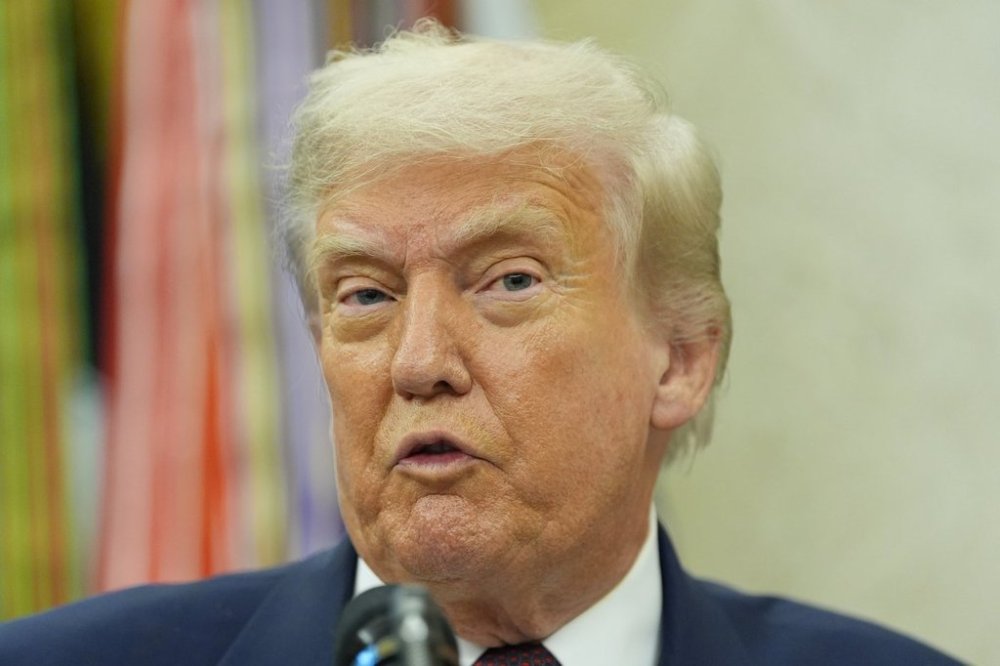Trump plans 100% tariff on computer chips, unless companies build in US
Advertisement
Read this article for free:
or
Already have an account? Log in here »
To continue reading, please subscribe:
Monthly Digital Subscription
$0 for the first 4 weeks*
- Enjoy unlimited reading on winnipegfreepress.com
- Read the E-Edition, our digital replica newspaper
- Access News Break, our award-winning app
- Play interactive puzzles
*No charge for 4 weeks then price increases to the regular rate of $19.00 plus GST every four weeks. Offer available to new and qualified returning subscribers only. Cancel any time.
Monthly Digital Subscription
$4.75/week*
- Enjoy unlimited reading on winnipegfreepress.com
- Read the E-Edition, our digital replica newspaper
- Access News Break, our award-winning app
- Play interactive puzzles
*Billed as $19 plus GST every four weeks. Cancel any time.
To continue reading, please subscribe:
Add Free Press access to your Brandon Sun subscription for only an additional
$1 for the first 4 weeks*
*Your next subscription payment will increase by $1.00 and you will be charged $16.99 plus GST for four weeks. After four weeks, your payment will increase to $23.99 plus GST every four weeks.
Read unlimited articles for free today:
or
Already have an account? Log in here »
WASHINGTON (AP) — President Donald Trump said Wednesday that he will impose a 100% tariff on computer chips, raising the specter of higher prices for electronics, autos, household appliances and other essential products dependent on the processors powering the digital age.
“We’ll be putting a tariff of approximately 100% on chips and semiconductors,” Trump said in the Oval Office while meeting with Apple CEO Tim Cook. “But if you’re building in the United States of America, there’s no charge.”
The announcement came more than three months after Trump temporarily exempted most electronics from his administration’s most onerous tariffs.

The Republican president said companies that make computer chips in the U.S. would be spared the import tax. During the COVID-19 pandemic, a shortage of computer chips increased the price of autos and contributed to higher inflation.
Investors seemed to interpret the potential tariff exemptions as a positive for Apple and other major tech companies that have been making huge financial commitments to manufacture more chips and other components in the U.S..
Big Tech already has made collective commitments to invest about $1.5 trillion in the U.S. since Trump moved back into the White House in January. That figure includes a $600 billion promise from Apple after the iPhone maker boosted its commitment by tacking another $100 billion on to a previous commitment made in February.
Now the question is whether the deal brokered between Cook and Trump will be enough to insulate the millions of iPhones made in China and India from the tariffs that the administration has already imposed and reduce the pressure on the company to raise prices on the new models expected to be unveiled next month.
Wall Street certainly seems to think so. After Apple’s stock price gained 5% in Wednesday regular trading sessions, the shares rose by another 3% in extended trading after Trump announced some tech companies won’t be hit with the latest tariffs while Cook stood alongside him.
The shares of AI chipmaker Nvidia, which also has recently made big commitments to the U.S., rose slightly in extended trading to add to the $1 trillion gain in market value the Silicon Valley company has made since the start of Trump’s second administration.
The stock price of computer chip pioneer Intel, which has fallen on hard times, also climbed in extended trading.
Inquiries sent to chip makers Nvidia and Intel were not immediately answered. The chip industry’s main trade group, the Semiconductor Industry Association, declined to comment on Trump’s latest tariffs.
Demand for computer chips has been climbing worldwide, with sales increasing 19.6% in the year-ended in June, according to the World Semiconductor Trade Statistics organization.
Trump’s tariff threats mark a significant break from existing plans to revive computer chip production in the U.S. that were drawn up during the administration of President Joe Biden.
Since taking over from Biden, Trump has been deploying tariffs to incentivize more domestic production. Essentially, the president is betting that the threat of dramatically higher chip costs would force most companies to open factories domestically, despite the risk that tariffs could squeeze corporate profits and push up prices for mobile phones, TVs and refrigerators.
By contrast, the bipartisan CHIPS and Science Act that Biden signed into law in 2022 provided more than $50 billion to support new computer chip plants, fund research and train workers for the industry. The mix of funding support, tax credits and other financial incentives were meant to draw in private investment, a strategy that Trump has vocally opposed.
—
Liedtke reported from San Ramon, California.


